Blogging is more important than ever before.
But here’s the catch.
Thanks to unprecedented levels of content saturation and an influx of new material every day, it’s not enough to just publish a blog and hope for the best.
Not even close.
Instead, you need to be strategic, intentional, and highly targeted in everything you do.
Today, blogging isn’t the informal method of communication it once was, at least not if you want to be good at it. Instead, it’s a skilled type of content that can offer unparalleled success if you know how to do it well. Authority level well.
In this post, I’m going to give you a complete guide for writing blogs that win.
Blogging, By the Numbers
Today, the internet virtually runs on blogs.
By providing quality information, giving readers material to connect with, and providing a point of interest for readers in various niches and categories, blogs do several jobs at once.
- According to Impact Branding & Design, websites that blog have an average of 434% more pages indexed by Google. Every blog you write gives Google one more page to index which, in turn, helps your clients find you online more quickly.
- As it stands today, 45% of marketers report that blogging is the most critical piece of their entire content strategy. B2B marketers who view blogging as important produce 67% more leads than those who choose not to blog, or who blog only minimally.
- Marketers who make blogging a priority are 13 times as likely as their competitors to produce a positive ROI than their competitors.
- When a company blogs, it earns an average of 97% more inbound links to its website than its non-blogging competitors.
- When searching the web, a whopping 70-80% of all users ignore the paid advertisements displayed in Google and opt to interact with organic content, instead.
How to Write Blogs That Win in 10 Steps
The statistics above make it clear that blogging is critical, but how do you create good blogs that return a genuinely positive ROI? Here are ten steps:
1. Your Focus Should Be on Solid, Long-Tail Keywords
While keywords aren’t the driving force of blog rankings that they once were, they still play a significant role in providing structure and cohesion for a blog. Before we dig into this, though, keep this in mind: keyword density doesn’t matter as much as it used to. In fact, you barely need 1% density these days, so don’t trouble yourself counting keywords.
Unlike yesteryear, when the purpose of keywords was to fill your content like an overstuffed Thanksgiving turkey, the keywords of today exist to provide the “bones” of your content in a natural and organic way, which helps support semantic search.
How do you find the best long-tail keywords, you ask? Great question.
One of the best tools you can use for modern keyword research is SEMrush. Ideal for determining the monthly search volume, cost-per-click, competition, and difficulty of a given long-tail keyword, SEMrush is the perfect tool for building a keyword strategy to inform and shape your blogs.
Check out these SEMrush results for the keyword “online marketing tips and tricks”:
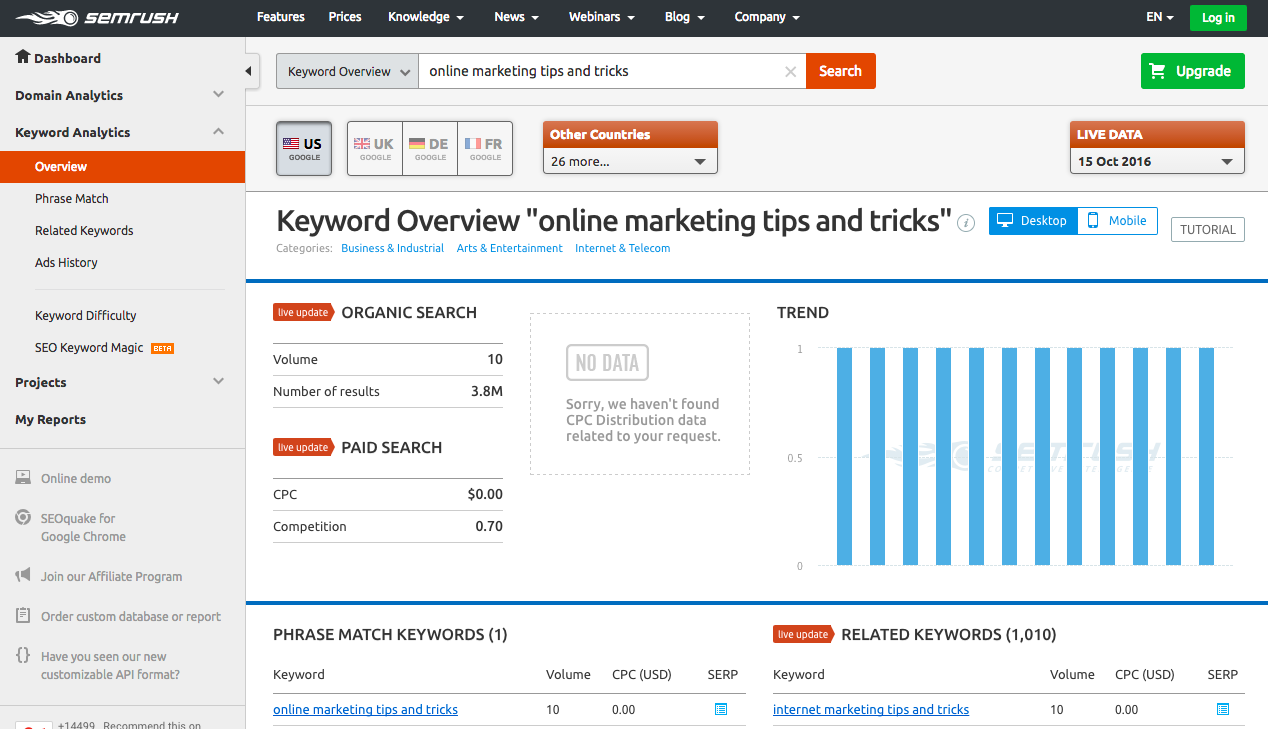
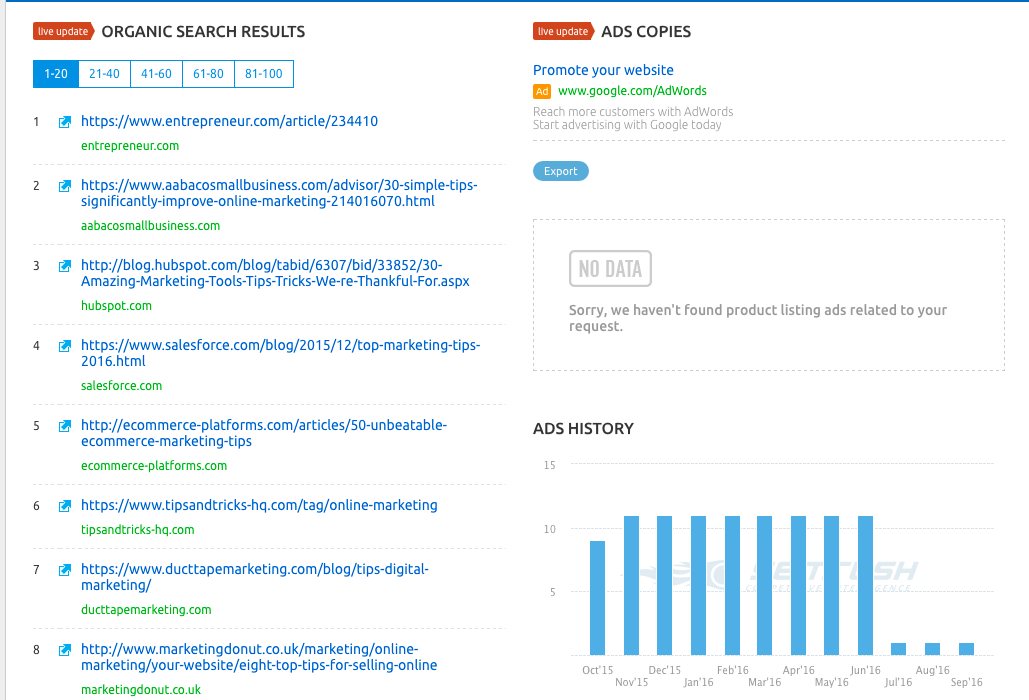
In addition to gaining insight into a given keyword, SEMrush also allows you to compare the difficulty of various keywords and determine which long-tail phrases will be ideal for your blog.
As you research your keywords, keep in mind that keywords don’t matter as much as the level of engagement, research, and expertise present in your blogs and that reliable and trustworthy content is more important than keyword inclusion. This brings us to the next point.
2. Write Your Most Authoritative, Trustworthy Content
While authoritative content has always been good for the reader, it’s good for search engines, as well. This biggest piece of evidence to support this is Google’s Search Quality Evaluator Guidelines. After a portion of the document was leaked last year, Google released the entire 160-page PDF to the public and shortened it to 146 pages this year.
The document, which Google designed as a training and guidance manual for its search quality evaluators, dives deep into what makes good web content and what Google doesn’t like. While most of it is pretty standard – queries with multiple meanings, etc., one of the largest and most outspoken pieces of the document is the concept of EAT and YMYL.
These two acronyms, standing for Expertise, Authoritativeness, Trustworthiness, and Your Money or Your Life, respectively, both refer to the qualities of a good web page. EAT, for example, indicates that high-quality pages must possess a high level of expertise, authoritativeness, and trustworthiness.
Check out this screenshot from the guidelines themselves:
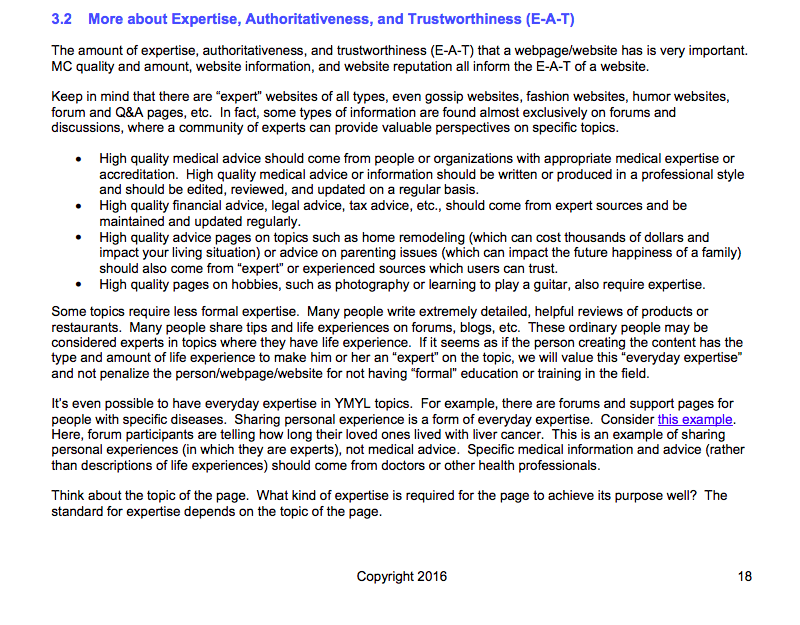
YMYL, on the other hand, indicates a unique quality standard of web page, called a Your Money or Your Life page. These are pages that feature content that has a potential to negatively impact a reader’s health, wealth, or personal wellness if it is not expert and authoritative. Examples include pages with medical or financial information.
According to Google’s guidelines, high-quality pages must have a large amount of expertise, authoritativeness and trustworthiness, and a satisfying amount of professional, high-quality content.
With that in mind, taking the extra time to write authoritative and expert-level content is essential. Pages that lack these attributes may be down-rated by Google and are at risk of providing a poor user experience for readers.
3. Craft Unique, Well-Written Meta Descriptions
While many bloggers and marketers overlook meta information altogether, it’s an essential piece of writing a quality blog.
Metas are the organic search world’s PPC, and, as such, they’re critical to ensuring a high CTR for your blogs.
Unfortunately, many people don’t understand how to write meta content. So, first things first, what is a meta description?
A meta description is a form of HTML tag that helps visitors determine what your site is about so they can choose the right result from a search page. Here’s an example of what a meta description looks like (indicated by the red arrow) in the Google SERPs for the query, “how to start running,”
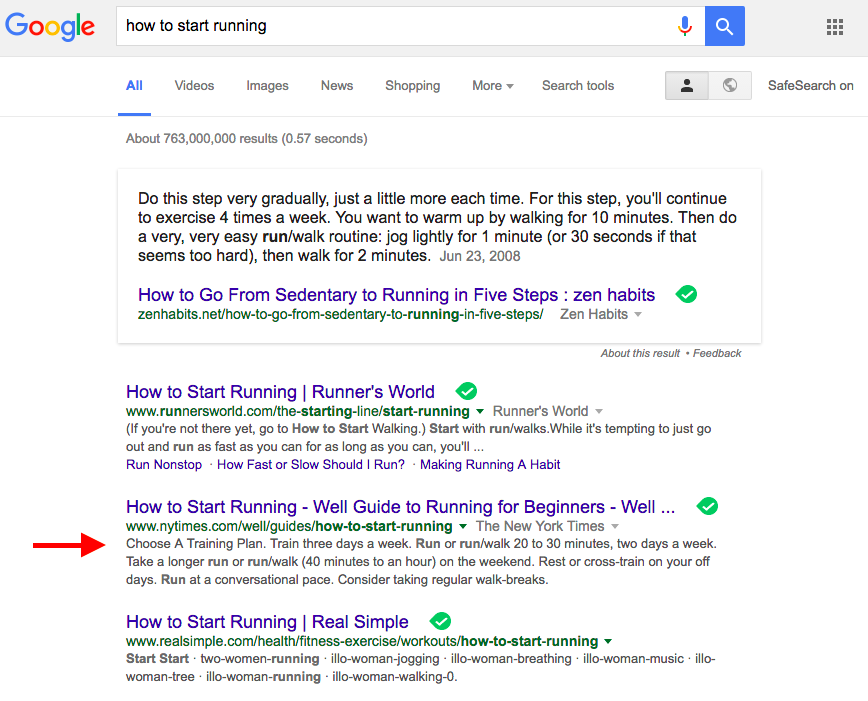
And another for the query “Design your own Nikes.”
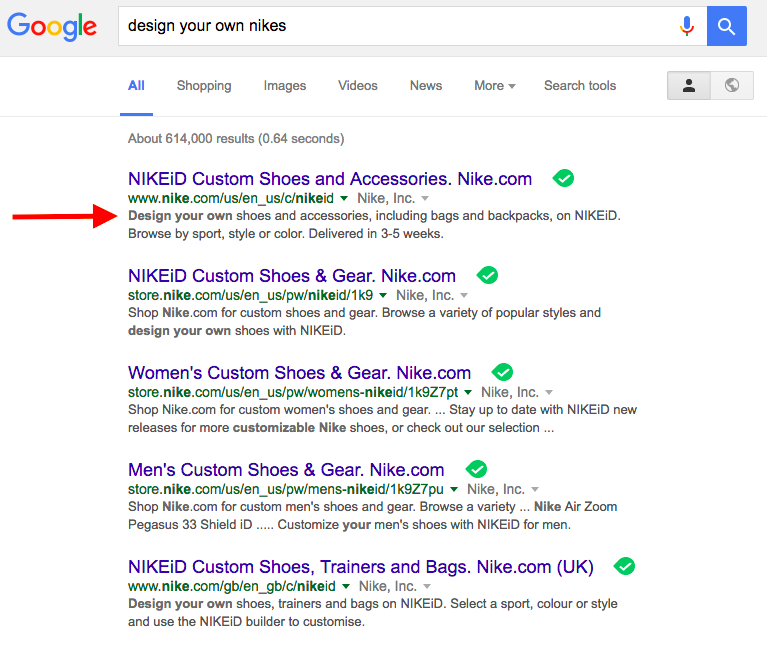
In its raw form on your website, a meta description looks like this:
<meta name=”description” content=”Your page’s description goes here.”/>
While Google has said that meta descriptions don’t affect ranking, it’s still essential to write them so that they can be coherent, useful, and relevant to Google searchers. Why? When your meta descriptions are good, they improve the click-through-rate of your site. This, in turn, boosts your search ranking.
3 Easy Guidelines for Meta Descriptions
- Keep them short: Meta descriptions should be roughly 155 characters or less. Don’t go over 160 or you risk getting truncated by Google.
- Include relevant keyword phrases: Keyword phrases help show that your page is relevant to a searcher’s query, and, when used naturally, can help boost your CTR.
- Keep them original: Duplicate meta tags can damage your ranking and cause viewers to skip over your page, viewing it as spammy. Write a new meta for every page you create.
In addition to meta descriptions, you’ll also need to learn to write good meta titles. Also known as the SEO title, the meta title is the title that a search engine like Google displays to users just above your meta description.
Here is the meta title in the same “Design your own Nikes” query:
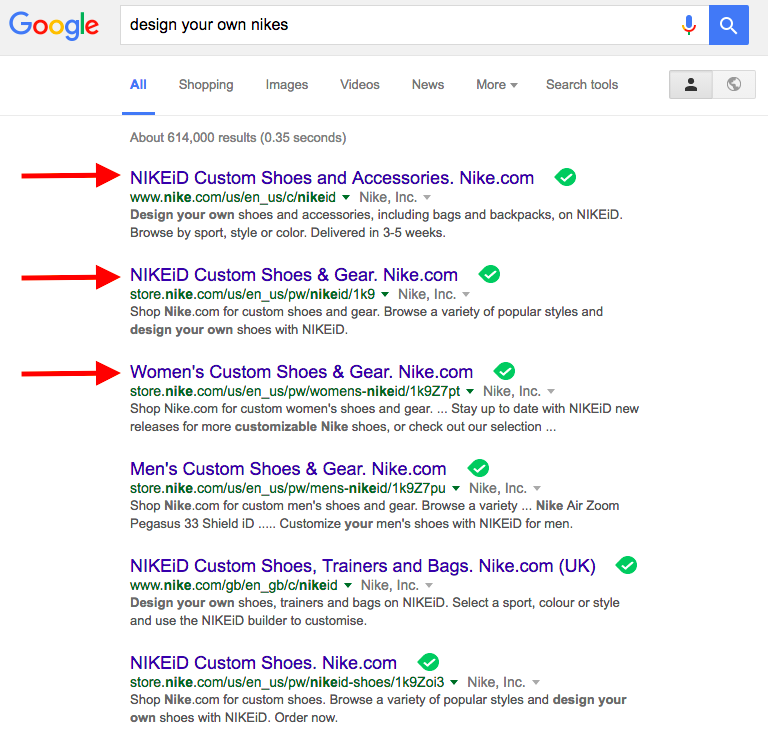
While both forms of metas are critical for user experience, it’s arguable that your meta title makes a larger impact, since 80% of people read headlines, and only 20% click through to read the body copy.
3 Guidelines For Meta Titles
- Keep them the correct length: According to Moz, Google typically displays full text when meta titles are between 50-60 characters, after that, they risk being truncated. For best results, keep your metas 55 characters or shorter.
- Include primary keywords: As is true with meta descriptions, you’ll want to include relevant keywords in your meta title for optimal search rankings.
- Make them compelling: Again, more people will read your headline than will read your body content. Be sure it’s worth their while.
While writing a good meta title may seem like an unnecessary pursuit, it can make all the difference for the click-through-rate of your blogs.
4. Flesh Out Your Blogs with Quality Images
While 90% of the battle of writing a winning blog is crafting the text, visuals are more important to an excellent blog than they’ve ever been before. In addition to illustrating key points, like the screenshots in this blog are doing, visuals help inspire audience interest, which can make your blogs more readable, and more shareable.
According to HubSpot, including colored visuals in a blog boosts a person’s willingness to read it by 80%, and content that includes relevant images earns an average of 94% more views than text-only content.
With this in mind, grab some in-depth screenshots to add to your blog, hire out a custom infographic, or include some beautiful (free) stock photos from any one of the best stock photo sites on the web.
Visuals don’t detract from your text – instead, they enhance it and make it more exciting and relatable for readers.
5. Enlist Blogging Support
Perhaps one of the best blogging tips of all time is to reach out for help. As your company and content demands grow, it’s critical not to be the sole person in charge of your blogging. While many marketers think they can do this, the fact of the matter is that shouldering the entire burden of your content leads to mistakes, and this, in turn, leads to alienated readers and a less-than–ideal content strategy.
While content is critical for your online presence, blogs take a long time to create, and it can be difficult to create good blogs while also managing all of the other aspects of your business. Because of this, every business needs a blog writer, and many find that hiring one was one of the best things they’ve ever done for their content.
If you’re considering hiring a blog writer to help you create winning content, look for the following traits:
- Experience with multiple content formats: The best content strategy is a diverse content strategy, and the blogger you hire should also be well-versed in social media, web content, and the importance of visual material. By finding a professional who checks all of these boxes, you can ensure that your blogs go way beyond a surface level.
- Knowledge of current SEO standards: SEO changes on a regular basis and the best blogger you can hire is one who understands what Google wants at any given moment. From optimal meta description lengths to best practices for pop-up ads, your blog writer needs to have his or her finger on the pulse of everything that is online marketing and SEO. Without this knowledge, you put yourself at risk of receiving Google penalties or just missing out on the ample SEO opportunities that exist for you and your company.
- Quality references and happy customers: You don’t want to take the time to train someone to be a web blog writer. In addition to taking too long, this is an approach that is bound to lead to mistakes and disappointment down the road. Instead, look for someone that already has experience in the industry.
In addition to making your content creation process easier, hiring content help also ensures high-quality blog material your readers will love.
Winning Content Starts With You
While writing winning blog posts can seem challenging, these tips – from crafting professional meta content to finding the best long-tail keywords for your topic – can help to improve your blogging on every level. From SEO, down to the experience of every person navigating a single blog on your site as a first-time reader.
Get focused, and create a blog strategy with value that stretches from today far into the future.
Image Credits
Featured image (c) Express Writers
Screenshots: Taken by author, October 2016




